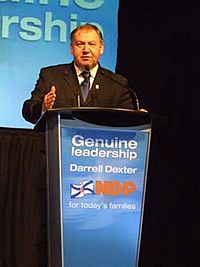Darrell Dexter facts for kids
Quick facts for kids
Darrell Dexter
ECNS
|
|
|---|---|

Dexter in 2012
|
|
| 27th Premier of Nova Scotia | |
| In office June 19, 2009 – October 22, 2013 |
|
| Monarch | Elizabeth II |
| Lieutenant Governor | Mayann Francis John J. Grant |
| Preceded by | Rodney MacDonald |
| Succeeded by | Stephen McNeil |
| Leader of the Nova Scotia New Democratic Party | |
| In office June 2001 – November 23, 2013 |
|
| Preceded by | Helen MacDonald |
| Succeeded by | Maureen MacDonald (interim) |
| Leader of the Opposition of Nova Scotia | |
| In office June 2001 – June 19, 2009 |
|
| Preceded by | Robert Chisholm |
| Succeeded by | Stephen McNeil |
| Member of the Nova Scotia House of Assembly for Cole Harbour Dartmouth-Cole Harbour (1998–2003) |
|
| In office August 5, 1998 – October 8, 2013 |
|
| Preceded by | Alan Mitchell |
| Succeeded by | Tony Ince |
| Personal details | |
| Born |
Darrell Elvin Dexter
September 10, 1957 Halifax, Nova Scotia, Canada |
| Political party | New Democratic Party |
| Spouse | Kelly Wilson |
| Alma mater | Dalhousie University University of King's College |
| Profession | |
| Military service | |
| Branch/service | Canadian Forces |
| Rank | Sub-lieutenant |
Darrell Elvin Dexter (born in 1957) is a Canadian lawyer and journalist who was the 27th premier of Nova Scotia. He served as premier from 2009 to 2013. A premier is the head of government for a Canadian province.
Dexter was a member of the Nova Scotia New Democratic Party (NDP) and was the party's leader from 2001 to 2013. In 2009, his party won the election, making him premier. This was a historic moment because it was the first time the NDP had ever formed a government in Atlantic Canada.
His government lost the election in 2013. After leaving politics, Dexter began working as a lobbyist, which means he talks to government officials on behalf of different groups.
Contents
Early Life and Career
Darrell Dexter was born on September 10, 1957, in Halifax, Nova Scotia. He grew up in the small community of Milton. He was the first person in his family to attend university.
Dexter earned degrees in education, law, and journalism. For a time, he worked as a reporter for a newspaper. He also served in the Canadian Forces as a naval officer.
Before entering provincial politics, Dexter was a lawyer. He was also a city councilor in Dartmouth from 1994 to 1996. He is married to Kelly Wilson, and they have one son.
Entering Provincial Politics
In 1998, Dexter was elected to the Nova Scotia Legislature as a Member of the Legislative Assembly (MLA). An MLA represents the people of their local area, called a riding or district. He was re-elected four times.
In 2001, he became the leader of the Nova Scotia NDP. As leader, he led his party in three provincial elections.
2003 and 2006 Elections
In the 2003 election, Dexter's NDP party won more seats than before. The Progressive Conservative party won the most seats but didn't have a majority. This is called a minority government, which means they needed support from other parties to pass laws.
In the 2006 election, the NDP did even better. The party won 20 seats, which was the best result in its history. Dexter was easily re-elected in his own riding of Cole Harbour. The NDP became the official opposition, which is the party with the second-most seats.
Winning the 2009 Election
The 2009 election was a major success for Dexter and the NDP. He campaigned on a plan called "Better Deal 2009," which made promises about jobs, healthcare, and energy costs.
On June 9, 2009, the NDP won a majority government. This means they won more than half the seats in the legislature, giving them the power to govern on their own. Dexter became the first NDP premier of Nova Scotia.
Premier of Nova Scotia (2009–2013)
As premier, Dexter's government focused on several key areas. They worked to control government spending and passed a budget with a large surplus in 2011. A surplus is when the government takes in more money than it spends.
His government also made some important changes. They banned uranium mining and the use of certain pesticides. They also created a new strategy to get more of the province's electricity from renewable sources like wind and water power.
Key Projects and Challenges
Dexter's government helped the Halifax Shipyard win a major contract to build ships for the Canadian government. This was expected to create many jobs. They also made a deal with Newfoundland to bring hydroelectric power to Nova Scotia through the Lower Churchill Project.
However, the government also faced challenges. A report from the auditor general found that some politicians from all parties had spent public money inappropriately. Dexter promised to reform the rules to make spending more open and responsible.
End of Term and 2013 Election
In the 2013 provincial election, the NDP government was defeated by the Nova Scotia Liberal Party. The NDP's number of seats fell from a majority to just seven, making them the third party in the legislature.
Dexter himself lost his seat in his riding by a very small number of votes. He was the first premier in Nova Scotia in over 80 years to lose his own seat in an election. He officially stepped down as premier on October 22, 2013, and resigned as NDP leader a month later.
Life After Politics
After leaving politics, Darrell Dexter took on new roles. He became a vice-chair at a government relations firm. He also teaches about public policy at Dalhousie University. In 2014, he traveled to the country of Tunisia to observe their elections and make sure they were fair.
See also
 In Spanish: Darrell Dexter para niños
In Spanish: Darrell Dexter para niños
 | Bessie Coleman |
 | Spann Watson |
 | Jill E. Brown |
 | Sherman W. White |


